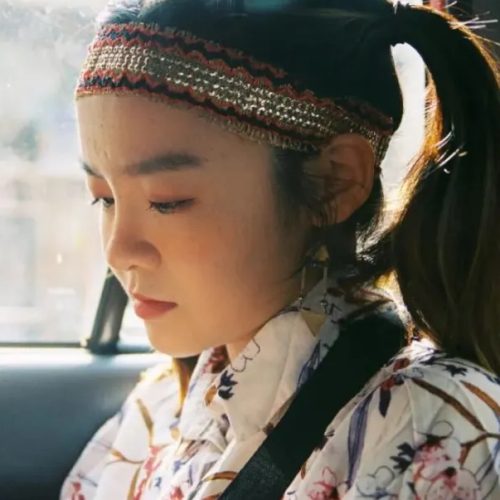Shi Lu (石璐) “Atom” has been on the scene for awhile.
Which, for a lot of people, is pretty surprising: packed in a tiny body and a face full of youthful exuberance, Shi Lu’s status as a single mother nearing 40 flies in the face of what the traditional idea of a rocker looks like for many – particularly a drummer.
But Shi Lu’s nickname “Atom” comes from more than just her small size. Referencing a manga about a little boy with superhero powers, she also explains that like an atom, she can make a big explosion. And in 2005, at the age of 21, she did just that by joining the indie rock band Hedgehog, and cementing herself in the Beijing rock scene as an aggressive drummer capable of capturing the essence of many different genres. At times, her sweet voice shouts kindly over the crowd, “Hello Hello Hello, we’re Hedgehog!” and at others, “There is no aura of God – hold the ordinary in your hands!”
The combination of her demure look and hardcore philosophy packs her persona with deeply motivating disparity, cutesy but nihilistic, and bordering on absurd.
Like many bands, she and the lead singer struck up an offstage romance for 7 years that ultimately fizzled out in 2013. In that time, Shi Lu married and divorced, and became a single mother. But the band struggled on and eventually hit a degree of success in with the general public in 2018 that forced the two to stay together – resulting in no small amount of internet drama based off vitriolic post-concert comments on Weibo, especially over the turbulent pandemic period – until finally, in March of this year, Shi Lu formally departed Hedgehog on the best terms the band could manage.
For some, this change is great news, as it heralds the release of her first solo album, Give Some Sunshine and It Will Be Brilliant (給點陽光就燦爛); but for others, Shi Lu’s departure from the band is reason enough to ditch her, her album reviews flooded with those one-star bombing the album and telling her to stick to the drums.
But Shi Lu stands firm in her convictions, unapologetic about the changes she’s gone through:
“There is no need to compromise with anyone, and no matter whether others like it or not, that is who I was at a certain moment.”
Shi Lu
In support, the best of the music scene join on her debut. The first to leave Hedgehog some while back, bassist Boxuan, returns, as well as Pan Gaofang (of Gaofunk, G-ELEVEN, and Candy Gun) on guitar, and the renowned jazz musician Wen Zhiyong on trumpet.
Much of the album revolves around Shi Lu’s thematic belief in music being like a plant you grow – and for that, she insists, you need a lot of crap. Her daughter even describes her mom’s music as characteristically brown, and the lead single, “Same Sh*t,” emphasizes the ability to turn daily monotony into something powerfully moving. Skidding through genres – punk, rock, ska, prog, shoegaze – she expresses both a sense of despair and joy for the world, and aboveall a love for the grime that turns into fertilizer and grows it all.
In “Morning or Night,” the penultimate song before the cincher that goes ultimately joyful and jazzy, Shi Lu expresses the darker side of things in a unique song composed in English, delving fully into a slow, slinking sound. Like the ballad on a metal album – think Opeth’s “Harvest” – or even a darker take of Linda Perhac’s “Hey, Who Really Cares?” – or if Mazzy Star’s “California” was less morose, and more gothic.
I see the sky is blue
I see the tree is green
I see the river is white
(I see) people laugh and cry
So beautiful they are
Like a shinigami – a god of death – overlooking the “world of mortals,” Shi Lu expresses a mindset heavily focused on mortality, who sees beyond the present moment to the bones we become, the sun which will, terrifyingly – & ultimately – blink out:
But they are dead
Good morning or night
Never, never mind
The sun is black
The sun is black
The rhythm of a single keyboard note pierces the song until it staggers and spills out in a trio, a fourth, a falling fifth and regains its pace; a chorus edges softly in, as if a thin mist. When her voice seems tired from what it’s foretelling, like a punk Cassandra whose warnings won’t be believed, the electric guitars speak for her until she can express her frustration:
I can feel it, but can’t touch it
I can hear it, but can’t talk it
I can see it, but can’t find it
Lose my eyes, my mouth, my brain, my hand, and my heart
As the narrator sings a reverse treatise: now the sky is not blue, the river is dry, the world is desolate and empty, she rings out a red sunset:
The sun is red
Song, quiet
Close your…
While the song peters out into a significantly depressing conclusion, the purpose in expression is release, a kind of irony that is beautiful in its subtext. Ultimately, Shi Lu is the kind of person who creates music to keep hope alive in others, something to sing along to in moments of fear and dread, something that is solace.







